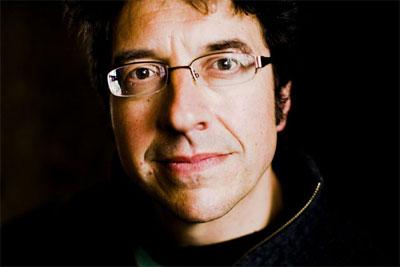A Church Full of Underminers, and George Monbiot
Posted by keith on 31st May 2010
At 10.28 on Saturday 28th May 2010, there were three people sitting on chairs in the small church of St John’s, Llangollen…I wasn’t too worried, as the Dark Mountain Journal was being launched in the large hall up the street, and was running over by about 10 minutes – maybe I would get the 20 or so people I had reckoned on. By 10.40, every chair was taken, and people were sitting on the floor: over 50 people had come along to hear a talk I was giving called “Breaking the Tools of Disconnection”, and I was delighted with the attendance.
After an hour ideas were flying around the room suggesting ways we could undermine the industrial machine – suggestions including the simple but brilliant idea of counselling people that they were actually good people, thus countering the negative “anchors” placed in every single corporate advertisement – and there was a genuine air of excitement that people were feeling individually empowered rather than stuck with the same, staid, bloated movements we have been led to believe will Save The Planet™. These are the very movements that George Monbiot believes are necessary to cut greenhouse gas emissions in the industrial world by at least 90% (this is Monbiot’s own figure from “Heat” which he has since said was a underestimate).
My focus was not on movements, although I did point out that they had all dismally failed to achieve anything tangible on a large scale; rather the need to recognise that the only way to cut greenhouse gases by the necessary levels and prevent the continuation of global ecocide is to remove industrial civilization. My argument is based on the following facts:
1) There is a lock-step relationship between global economic activity and greenhouse gas emissions which only loses it’s potency during major disruptions of the economic system.
2) There is a similar relationship between economic activity and other destructive activities such as deforestation, marine protein depletion, and water pollution, especially as an industrial system is adopted by new groups of people.
3) Therefore, in order to reduce greenhouse gases, and more direct forms of environmental destruction, by the sorts of levels mentioned above, economies must dramatically contract – in the case of greenhouse gases, by a commensurate amount.
4) Under the capitalist system, economies have to continue to grow by between 3% and 5% per annum in order to remain “stable”; even steady-state economies are extremely vulnerable under a system that requires profit and continual reinvestment, and economies with negative growth are bound to experience collapses.
5) It is impossible, under the market economy – the engine of Industrial Civilisation – for civilisation to exist if we are to maintain a global ecology that can sustain any significant amount of human life into the future.
A few of us went for a bit of lunch in Llangollen, and to talk over the workshop and Dark Mountain in general. It transpired that George Monbiot had been in my workshop, at the back of the room and because I was addressing the audience in general, and getting a good dialogue going, I had failed to notice him leave about ten minutes before the end. Apparently he’d been smiling to himself from time to time.
After a brilliant session of music by Jon Boden in the main venue, and three inspiring and fascinating expositions of the problems we face from Paul Kingsnorth, Lottie Child and Vinay Gupta, there followed a discussion between Dougald Hine and George Monbiot. George does not think much of Dark Mountain – in fact the disagreement over the “need” for civilisation has persisted for some time between Paul Kingsnorth and George Monbiot.
I was not impressed with the flaccid nature of the discussion, not so much because of the lack of incisive questions from Dougald (he had promised to step back a bit and open up the dialogue) but because George was avoiding addressing anything significant – like the relationship between climate change and civilisation – in favour of syntactical arguments over the nature of environmental movements and…in fact I struggled to remember anything about the discussion before I replayed the recording I made at the time.
Below is an edit of George’s statements, prior to the question and answer session; nothing has maliciously been taken out of context, but I have extracted what I think are a number of telling remarks that say a lot about George’s view of civilisation and whether it should continue. The last comment – an attempt to humorously pastiche Dark Mountain supporters – is particularly revealing:
Edit: George Monbiot at Uncivilisation 2010
As we exited the hall, I almost bumped into George, and as he turned around the following conversation occured:
Me: Hi George, you were in my workshop, weren’t you?
GM: Yes. [smiles uncomfortably]
Me: I think we need to have a nice civilised chat.
GM: [exiting rapidly] You’re going to sabotage me!
It occured to me later on that, somehow, I had scared the willies out of the eminent George Monbiot. I don’t quite know how: perhaps he had felt uncomfortable being mentioned in my workshop while he sat there, but I wasn’t rude in any way; perhaps he felt threatened at being asked for a chat by a smiling man with stubble, but there were lots of other people around and he is taller than me; perhaps he didn’t think he would get off as lightly as he did in the main hall, although I did just want a chat. Who knows?
But regardless of this, the most prominent British environmental writer of the last two decades really seems to have a problem facing up to the reality of Industrial Civilisation and the simple fact that you can’t leave the legacy of a survivable global ecology while you have a global industrial system. Maybe another fact stands in the way of such mental clarity: you can’t be a successful mainstream environmental writer if the people you depend upon for your wages are threatened by what you say.
And if you’re reading this, George, the offer of a chat is still on the table – I’ll even buy you a beer.
Posted in Uncategorized | 13 Comments »






